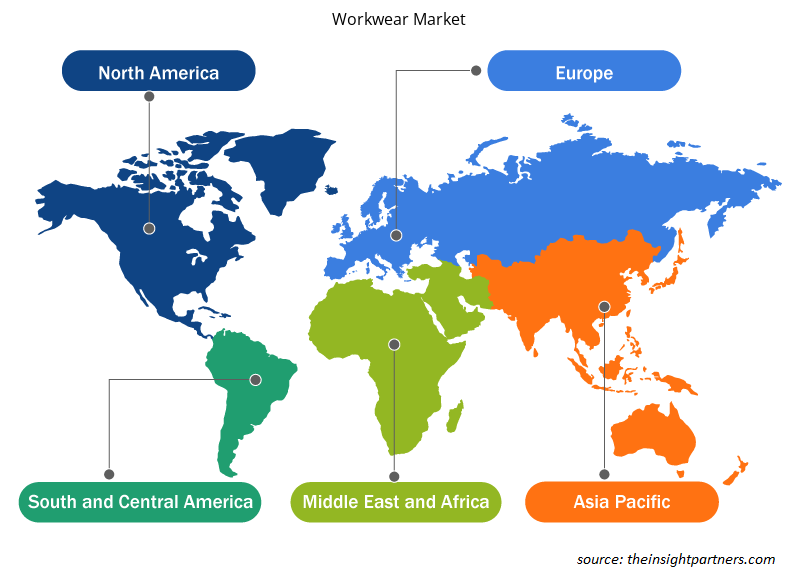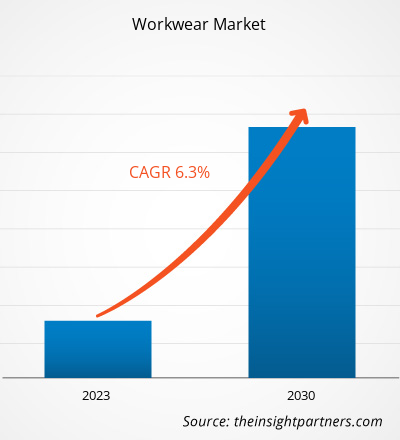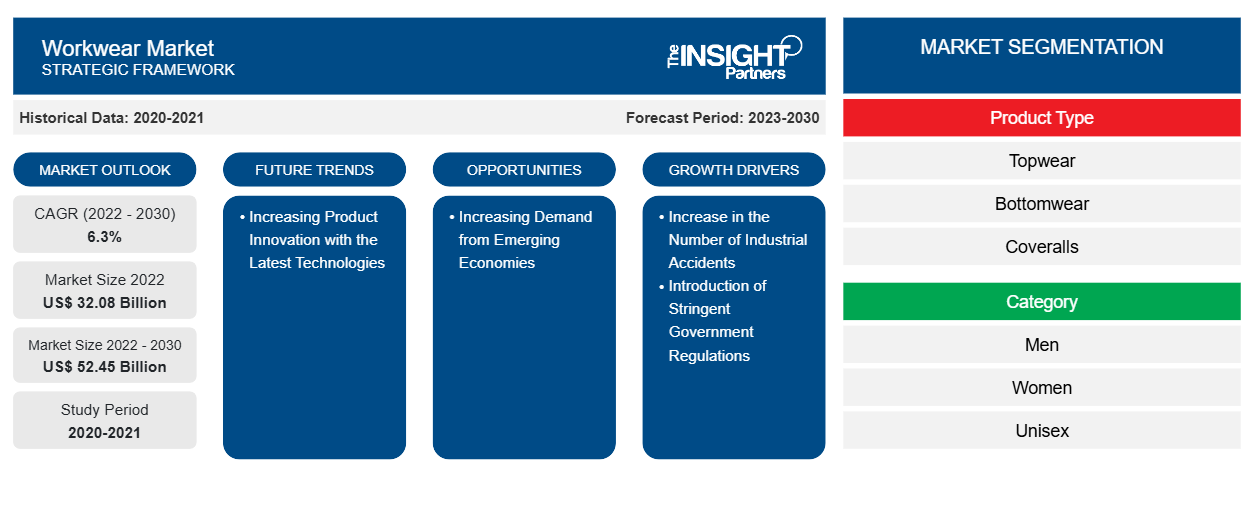[研究报告] 工作服市场规模预计将从 2022 年的 320.7876 亿美元增长到 2030 年的 524.4815 亿美元;预计 2022 年至 2030 年市场复合年增长率为 6.3%。
市场洞察和分析师观点:
工作服是工作时穿着的安全服装和制服,尤其是涉及体力劳动的工作。它们促进工人的安全并确保健康的工作环境。工作服广泛应用于石油和天然气、化学品、建筑、医疗保健、酒店、农业、采矿等各个领域。过去几年,工业部门对工人安全的担忧迅速增加。各政府和安全协会都在实施行业准则以确保工人的安全,这导致对工作服的需求激增。
增长动力和挑战:
工业事故是各工业部门关注的主要问题之一。这些事故对人类健康造成严重后果。全球各行业都发生了许多事故,例如建筑、石油和天然气以及采矿业。根据国际劳工组织 (ILO) 的数据,每年记录的与工作相关的死亡人数约为 278 万,其中 240 万与职业病有关。此外,全球每年发生约 3.4 亿起职业事故,1.6 亿人患上与工作相关的疾病。由于工业事故数量不断增加,雇主正在采用国家和国际组织制定的多项标准,以确保员工在工作场所的健康和安全。工业工作服旨在为用户提供保护和舒适感,帮助他们避免在工作场所发生严重死亡事件,从而提高工人的工作效率。功能性工作服在跨多种工业基地工作时提供安全性和耐用性。因此,工业事故和工作相关死亡率的增加,增加了对工作服的需求,以确保工人的安全,这反过来又促进了工作服市场的增长。
此外,工人缺乏有关工作场所安全和工作场所可能存在的健康危害的知识是全世界关注的一个重大问题。为了提高人们的认识,许多政府和非政府组织正在推出与工人健康和安全有关的各种计划和活动。据美国标准组织称,在北美,美国劳工部和职业安全与健康管理局(OSHA)负责规范职业安全和健康标准领域。参与制定防护服标准的组织包括美国材料与试验协会(ASTM)、美国国家消防协会(NFPA)、国家职业安全与健康研究所(NIOSH)、美国国家标准研究所(ANSI)、美国纺织化学家和染色师协会(AATCC)和工业安全设备协会(ISEA)。因此,提高对工作场所安全的认识极大地推动了工作服市场的增长。
定制此报告以满足您的需求
您可以免费定制任何报告,包括本报告的部分内容、国家级分析、Excel 数据包,以及为初创企业和大学提供优惠和折扣
-
获取此报告的关键市场趋势。这个免费样品将包括数据分析,从市场趋势到估计和预测。
报告细分和范围:
全球工作服市场根据产品类型、类别、分销渠道、最终用途和地理位置进行细分。根据产品类型,市场分为上衣、下装和工作服。根据类别,市场分为男装、女装和中性装。根据分销渠道,市场细分为批发商、超市和大卖场、专卖店和在线平台。根据最终用途,工作服市场分为建筑、石油和天然气、化学品、医疗保健和其他。根据地理位置,分为北美(美国、加拿大和墨西哥)、欧洲(德国、法国、意大利、英国、俄罗斯和欧洲其他地区)、亚太地区(澳大利亚、中国、日本、印度、韩国和亚太地区其他地区)、中东和非洲(南非、沙特阿拉伯、阿联酋和中东和非洲其他地区)以及南美洲和中美洲(巴西、阿根廷和南美洲和中美洲其他地区)。
节段分析:
根据产品类型,工作服市场分为上衣、下装和连衣裤。预计在预测期内,连衣裤细分市场的复合年增长率最高。连衣裤是穿着的单件或双层服装,用于保护工作场所的整个人体。这些连衣裤主要由尼龙、棉和聚酰胺纤维制成。由于职业危害风险高,它们通常用于化学加工厂和油漆涂料和石油天然气等行业。这些因素推动了连衣裤细分市场的市场增长。
区域分析:
根据地理位置,工作服市场分为五个主要区域:北美、欧洲、亚太、南美和中美以及中东和非洲。北美主导了全球市场;该地区的市场价值在 2022 年达到 83.6 亿美元。预计亚太美洲市场在预测期内的复合年增长率将达到 7.1%。2021 年,国际劳工组织 (ILO) 表示,亚太地区每年有超过 110 万人因职业事故或与工作有关的疾病丧生。印度等亚太地区的各国劳动力保护最少、信息最少、培训最少。妇女、儿童、残疾工人、移民工人和少数民族是受影响最严重的人群,经常发生职业事故。因此,为了减少此类职业事故和伤害,建筑、制造业、石油和天然气等多个行业都在大量投资于员工的工作安全。因此,由于对工作服的需求很高,亚太地区的工作服市场正在显著增长。
行业发展和未来机遇:
工作服市场主要参与者采取的举措如下:
- 2020 年 2 月,霍尼韦尔国际公司与 Tech Mahindra Limited 宣布合作,利用行业领先的数字技术开发和打造“未来工厂”。此次合作的重点是数字化转型,使制造业的客户能够更快地扩大规模。
- 2020 年 7 月,Loyal Textile Mills Limited 推出了 Viral Shield,这是一系列可重复使用的 PPE、口罩和防护服,用于防御抗菌活性,特别是针对 SARS-CoV-2 病毒。
工作服市场区域洞察
Insight Partners 的分析师已详尽解释了预测期内影响工作服市场的区域趋势和因素。本节还讨论了北美、欧洲、亚太地区、中东和非洲以及南美和中美洲的工作服市场细分和地理位置。

- 获取工作服市场的区域特定数据
工作服市场报告范围
| 报告属性 | 细节 |
|---|---|
| 2022 年市场规模 | 320.8亿美元 |
| 2030 年市场规模 | 524.5亿美元 |
| 全球复合年增长率(2022 - 2030 年) | 6.3% |
| 史料 | 2020-2021 |
| 预测期 | 2023-2030 |
| 涵盖的领域 |
按产品类型
|
| 覆盖地区和国家 |
北美
|
| 市场领导者和主要公司简介 |
|
工作服市场参与者密度:了解其对业务动态的影响
工作服市场正在快速增长,这得益于最终用户需求的不断增长,这些需求源于消费者偏好的不断变化、技术进步以及对产品优势的认识不断提高等因素。随着需求的增加,企业正在扩大其产品范围,进行创新以满足消费者的需求,并利用新兴趋势,从而进一步推动市场增长。
市场参与者密度是指在特定市场或行业内运营的企业或公司的分布情况。它表明在给定市场空间中,相对于其规模或总市场价值,有多少竞争对手(市场参与者)存在。
在工作服市场运营的主要公司有:
- Carhartt 公司
- 爱玛客
- 阿尔西科集团
- 亚历山德拉
- 拉丰特公司
免责声明:上面列出的公司没有按照任何特定顺序排列。

- 获取工作服市场顶级关键参与者的概述
COVID-19 疫情影响:
COVID-19 疫情对各国几乎所有行业都产生了不利影响。北美、欧洲、亚太地区 (APAC)、南美和中美以及中东和非洲 (MEA) 的封锁、旅行限制和业务关闭阻碍了许多终端使用行业公司的增长。制造部门的关闭扰乱了全球供应链、生产活动、交付计划以及必需品和非必需品销售。2020 年,各公司的产品交付延迟,产品销售下滑,这阻碍了工作服市场的发展。在 COVID-19 疫情期间,劳动力短缺、进出口禁令和原材料供应有限也导致全球运营和流程停止。这些因素对疫情期间工作服市场的增长产生了负面影响。
然而,2021年,随着一些政府取消了先前实施的限制,各经济体恢复了运营,这对全球市场产生了积极影响。此外,制造商被允许满负荷生产,这有助于他们克服供需缺口。
竞争格局和重点公司:
Carhartt, Inc.、Aramark、Alisco Group、Alexandra、3M、A. LAFONT SAS、Fristads Kansas Group、Hultafors Group、Lakeland Industries, Inc. 是全球工作服市场的主要参与者。这些市场参与者采取战略发展举措来扩大业务,进一步推动工作服市场的增长。
- 历史分析(2 年)、基准年、预测(7 年)及复合年增长率
- PEST和SWOT分析
- 市场规模、价值/数量 - 全球、区域、国家
- 行业和竞争格局
- Excel 数据集
近期报告
相关报告
客户评价
购买理由
- 明智的决策
- 了解市场动态
- 竞争分析
- 客户洞察
- 市场预测
- 风险规避
- 战略规划
- 投资论证
- 识别新兴市场
- 优化营销策略
- 提升运营效率
- 顺应监管趋势























 获取免费样品 - 工作服市场
获取免费样品 - 工作服市场